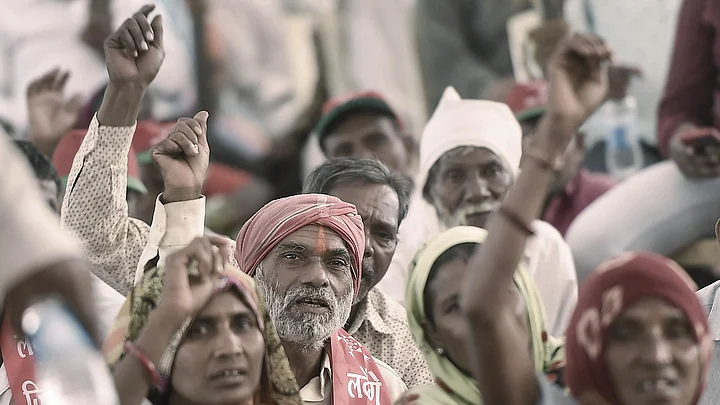People should never be just a number. But these days, they are not even a number.
Among all the ways in which governments blindside a citizen, perhaps the most comprehensive is ‘data invisibility’, or invisibilising a citizen in data. As data is necessary for decisions and policy, no action is possible without the relevant population numbers. For example, most recently, the Central government said in Parliament that there is no data on farmers who had died in farmers’ protests. This robs the farmers of recognition and respect and their families of compensation and gratitude.
The government had the wrong kind of data on the farmers’ protests. First, that the protests were being done by rich farmers. In fact, most farmers were small and marginal. Second, that the farm laws only hurt the middlemen, and they were protesting. In reality, most were farmers and their families. Third, that anti-national elements had infiltrated the protests. In truth, they were pro-national, which is why they won in the end.
The Protests Were Meticulously Managed
Despite such painstaking information gathered on the protesting farmers, the government claims to have no data on deceased farmers. Clearly, the repeal of the farm laws has its repercussions. Data invisibility is being used to keep the dead farmers off the records.
But just because the state does not have data, does not mean there is no data. Following is a sample of the details available about the deaths. Just three examples:
Gajjan Singh (55), a resident of Ludhiana’s Khatra village, died at the Tikri border near Delhi on 29 November 2020.
Sant Baba Ram Singh (65) of Karnal’s Singhra village shot himself dead on 16 December 2020 in protest.
Amarpal Dhull (32) of Kaithal’s Serdha suffered heart failure at the Tikri border on Delhi’s outskirts on 25 December 2021.
There is also a list of farmers who were injured in the protests. Two examples:
Raj Singh (73), of Haryana’s Sanghi village, was hit on the head in police action and left bleeding on 3 April 2021.
Mahinder Singh Punia (52) of Haryana’s Badota village was injured in police action on 28 August 2021.
As per farmers’ organisations, over 700 had died in the protests. This is a credible number.
This author is witness to the meticulous management of farmers at the Singhu and Tikri borders on Delhi’ outskirts. A control room maintained all details of farmers coming from all over the country and made frequent announcements on the public address system to keep them informed.
Why Are Some Sections Invisible to the State?
For the citizen, such data invisibility is of concern for two major reasons.
First. Data shows whether a citizen is being seen by the state or not. When a state does not count a citizen, it affects their rights, freedoms, policy and programmes. For example, for years, farmer suicides were denied by governments and only grudgingly admitted later. As the high numbers of farmer suicides reflect badly on a state government, the numbers are often compromised in procedure to keep them low. However, because there is data collection and publication, it provides visibility to the problem and to lives lost. As per the latest NCRB report, one farmer commits suicide every hour in India. Only data can reveal this shocking fact.
Second. Data invisibility is preceded by the actual invisibility of the segment of the population or the people affected. Governments have never seen the existence of these citizens and, therefore, do not have the data on them collected and published. The Census is not enough in a country with such vast disparities and inter-sectional influences. Those invisible to the state could be, for instance, sections of the farmers, the labour, the women, the minorities, the Dalits, the tribal, the unemployed, the disguised unemployed, etc.
Sanitation Workers, Migrants, Activists: The List is Endless
This is not the first time this government has miraculously been without data. But every time it did so, it has refused to see the citizen, their suffering and find a solution. Here is that painful list from the recent past:
No data on how many migrants died or were injured during lockdowns (Reply in Lok Sabha, Unstarred Question, September 2020)
No data on deaths caused by manual scavenging in the past 5 years (Reply in Rajya Sabha, Unstarred Question, July 2021)
No data on deaths of healthcare staff in pandemic (Reply in Rajya Sabha, Unstarred Question, September 2020)
No data on deaths of RTI activists (Reply in Lok Sabha, Unstarred Question, December 2019)
No data on safai karamcharis’ (sanitation workers) deaths during the pandemic (Reply in Rajya Sabha, Unstarred Question, September 2020)
No data on police personnel who died of COVID-19 (Reply in Lok Sabha, Unstarred Question, September 2020)
Governments should not be angry with people, governments should not hold a grudge. Letting the dead be forgotten and remain unsung is what the colonisers did to freedom fighters. Because they feared the memory of the dead would lead to an uprising. As history shows, this did not work well for the masters.
(Dr Kota Neelima is an author, researcher and Director at the Institute of Perception Studies, New Delhi. She writes on rural distress and farmer suicides. She tweets @KotaNeelima. This is an opinion piece and the views expressed above are the author’s own. The Quint neither endorses nor is responsible for the same.)
